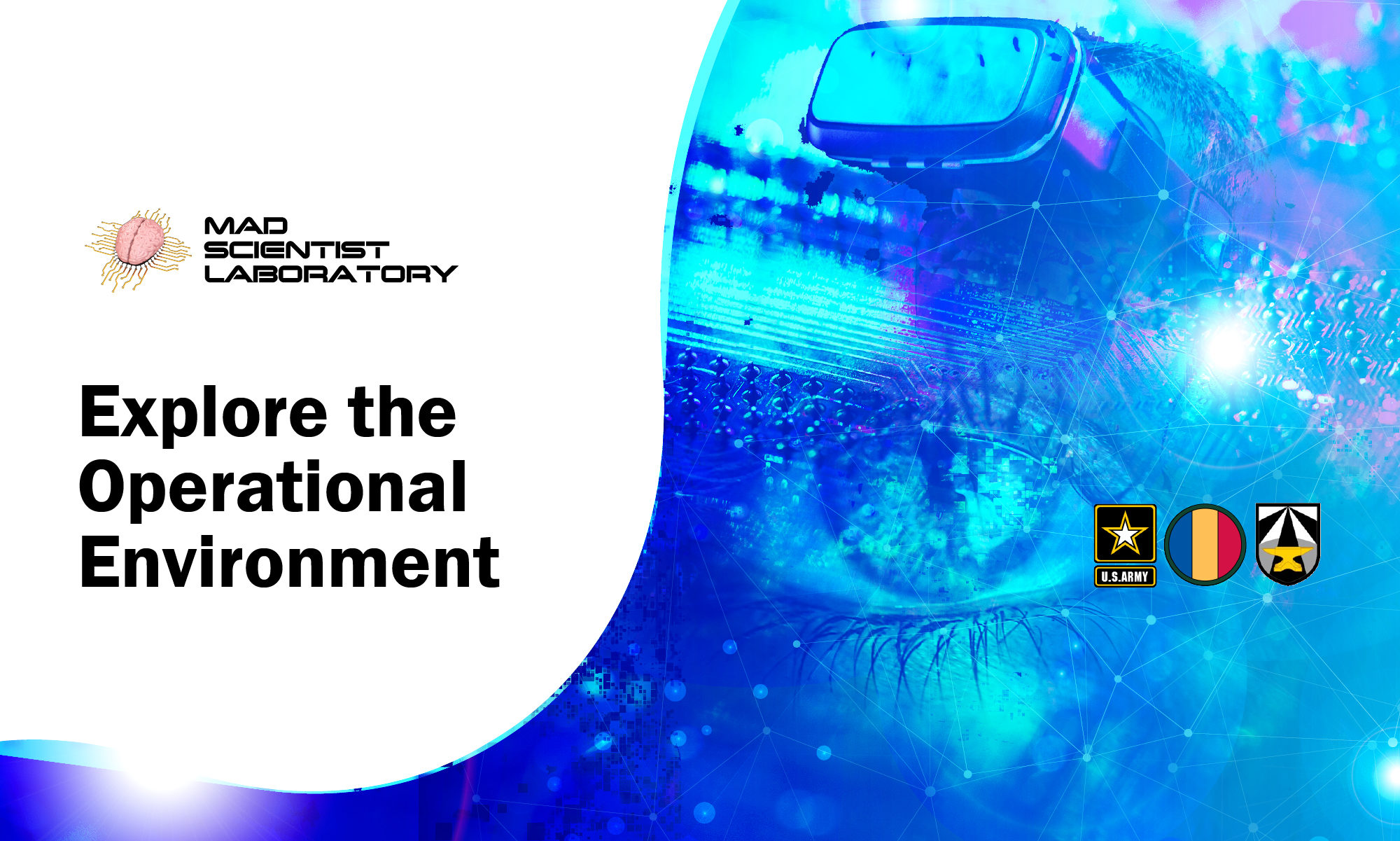Crowdsourcing the Intellect of the Nation
[Editor’s Note: Crowdsourcing remains an effective tool for harvesting ideas and concepts from a wide array of individuals, helping us to diversify thought and challenge conventional assumptions. Army Mad Scientist seeks to crowdsource the intellect of the Nation (i.e., you — our community of action!) with two concurrent opportunities this Spring. In our latest episode of The Convergence podcast, we explore these crowdsourcing opportunities — Read the highlights here, listen to the podcast, then get busy crafting your inputs to both!]
In today’s episode of The Convergence podcast, Army Mad Scientists Matthew Santaspirt and Raechel Melling discuss our two concurrent crowdsourcing opportunities: Calling All Wargamers and Wicked Problems Writing Contest — check out the highlights from this conversation below.
[If the podcast dashboard is not rendering correctly for you, please click here to listen to the podcast.]
1. Calling All Wargamers!
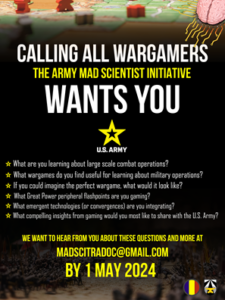
Regular consumers of Army Mad Scientist content — via this blog site and The Convergence podcast — understand how wargaming can enhance Professional Military Education (PME), hone cognitive warfighting skills, and broaden our understanding of the Operational Environment. Wargaming removes hierarchies and encourages players to attempt innovative solutions, while also creating a safe environment in which to fail repeatedly and learn from mistakes. Wargaming can also help us assess concepts and capabilities with a reasonable degree of verisimilitude — before committing the Nation to costly, and in some instances, irrevocable courses of action. In challenging our assumptions and reinvigorating our thoughts about Large-Scale Combat Operations (LSCO), wargaming can be a useful tool in facilitating life-long learning and guarding against that most fatal of flaws in assessing the Operational Environment — the failure of imagination!
Army Mad Scientist wants to hear from you about your wargaming experiences:
-
-
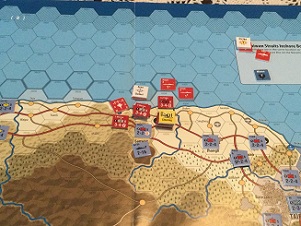 What are you learning about LSCO?
What are you learning about LSCO?
-
-
-
- What wargames do you find useful for learning about military operations?
-
-
-
- If you could imagine the perfect wargame, what would it look like?
-
-
-
- What Great Power peripheral flashpoints are you gaming?
-
-
-
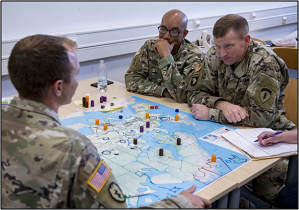 What emergent technologies (or convergences) are you integrating into your wargaming?
What emergent technologies (or convergences) are you integrating into your wargaming?
-
-
-
- What compelling insights from gaming would you most like to share with the U.S. Army?
-
Submit your responses to these questions and more at: madscitradoc@gmail.com NLT 11:59 pm Eastern on May 1, 2024.
Check out the following Mad Scientist Laboratory blog posts on wargaming:
Live from D.C., it’s Fight Night (Parts One and Two) and associated podcasts (Parts One and Two)
Would You Like to Play a Game? Wargaming as a Learning Experience and Key Assumptions Check and “No Option is Excluded” — Using Wargaming to Envision a Chinese Assault on Taiwan, by Ian Sullivan
Using Wargames to Reconceptualize Military Power, by proclaimed Mad Scientist Caroline Duckworth
Gaming the System: How Wargames Shape our Future and associated podcast, with guest panelists Ian Sullivan, Mitchell Land, LTC Peter Soendergaard, Jennifer McArdle, Becca Wasser, Dr. Stacie Pettyjohn, Sebastian Bae, Dan Mahoney, and Jeff Hodges
A New American Way of Training and associated podcast, with Jennifer McArdle
From Legos to Modular Simulation Architectures: Enabling the Power of Future (War) Play, by Jennifer McArdle and Caitlin Dohrman
The Storm After the Flood virtual wargame scenario, video, notes, and Lessons Learned presentation and video, presented by proclaimed Mad Scientists Dr. Gary Ackerman and Doug Clifford, The Center for Advanced Red Teaming, University at Albany, SUNY
The Metaverse: Blurring Reality and Digital Lives with Cathy Hackl and associated podcast
Gamers Building the Future Force and associated podcast
Fight Club Prepares Lt Col Maddie Novák for Cross-Dimension Manoeuvre, by now COL Arnel David, U.S. Army, and Major Aaron Moore, British Army, along with their interview in The Convergence: UK Fight Club – Gaming the Future Army and associated podcast
2. Operational Environment Wicked Problems Writing Contest
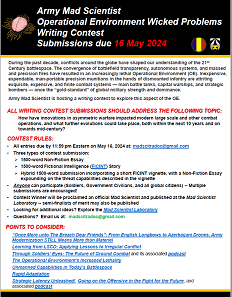 During the past decade, conflicts around the globe have shaped our understanding of Twenty-first Century warfighting. The convergence of battlefield transparency, autonomous systems, and massed and precision fires have resulted in an increasingly lethal OE. Inexpensive, expendable, man-portable precision munitions in the hands of dismounted infantry are attriting exquisite, expensive, and finite combat systems — main battle tanks, capital warships, and strategic bombers — once the “gold-standard” of global military strength and dominance.
During the past decade, conflicts around the globe have shaped our understanding of Twenty-first Century warfighting. The convergence of battlefield transparency, autonomous systems, and massed and precision fires have resulted in an increasingly lethal OE. Inexpensive, expendable, man-portable precision munitions in the hands of dismounted infantry are attriting exquisite, expensive, and finite combat systems — main battle tanks, capital warships, and strategic bombers — once the “gold-standard” of global military strength and dominance.
Army Mad Scientist is hosting a writing contest to explore this aspect of the OE. All entries must address the following topic:
How have innovations in asymmetric warfare impacted modern large scale and other combat operations, and what further evolutions could take place, both within the next 10 years and on towards mid-century?
We are accepting three types of submissions:
-
-
- 1500-word Non-Fiction Essay
-
-
-
- 1500-word Fictional Intelligence (FICINT) Story
-
-
-
- Hybrid 1500-word submission incorporating a short FICINT vignette, with a Non-Fiction Essay expounding on the threat capabilities described in the vignette
-
Anyone can participate (Soldiers, Government Civilians, and all global citizens) — Multiple submissions are encouraged!
All entries are due NLT 11:59 pm Eastern on May 16, 2024 at: madscitradoc@gmail.com
Click here for additional information on this contest — we look forward to your participation!
Check out the following Mad Scientist Laboratory blog posts associated with previous writing contests:
The Future of the AI Battlefield:
Takeaways Learned about the Future of the AI Battlefield
The Guy Behind the Guy: AI as the Indispensable Marshal, by Brady Moore and Chris Sauceda
The Human Targeting Solution: An AI Story, by CW3 Jesse R. Crifasi
Back to the Future:
Task Force Wolf, by proclaimed Mad Scientist LTC Daniel Gomez
The Operational Environment: What Will Change and What Will Drive It – Today to 2035?
Splinternets, by proclaimed Mad Scientist Howard R. Simkin
The Operational Environment in 2035 Writing Contest:
Louisiana Maneuvers for the Age of Artificial Intelligence, by proclaimed Mad Scientist MAJ Michael B. Kim
The Information Disruption Industry and the Operational Environment of the Future, by proclaimed Mad Scientist Vincent H. O’Neil
Military Implications of Smart Cities, by Alexander Braszko, Jr.
Information Warfare Vignettes Writing Contest:
Three Best Information Warfare Vignettes, by proclaimed Mad Scientist Davis Ellison, Tony Stark, and Rob Kunzig
Competition, Crisis, Conflict, and Change Writing Contest:
The U.S. Joint Force’s Defeat before Conflict, by proclaimed Mad Scientist CPT Anjanay Kumar
The Future of War is Cyber! by CPT Casey Igo and CPT Christian Turley
A House Divided: Microtargeting and the next Great American Threat, by 1LT Carlin Keally
CALLING ALL CREATORS ~ An Army Mad Scientist Multi-Media Contest:
Kryptós, by proclaimed Mad Scientist CPT Katherine Hathaway
2nd Dense Urban Armored Brigade (DUAB) Personnel Evaluations, by Ed dos Santos, Jr.
Fall / Winter 2021 Writing Contest:
OASIS: A North American Proving Ground, by proclaimed Mad Scientist Steve Pomper
The Army’s Next Failed War: Large Scale Combat Operations, by proclaimed Mad Scientist MAJ Anthony Joyce
On Surprise Attacks Below the “Bolt from the Blue” Threshold, by Lesley Kucharski

Stay tuned to the Mad Scientist Laboratory for our next episode of The Convergence podcast on 2 May 2024, featuring Dennis Eger, Senior OSINT Advisor, and Shawn Nilius, Director, Army OSINT Office, discussing why OSINT is important to the Army, how it’s being used in contemporary operations, and how they see it evolving over the next 10 years!
Disclaimer: The views expressed in this blog post and podcast do not necessarily reflect those of the U.S. Department of Defense, Department of the Army, Army Futures Command (AFC), or Training and Doctrine Command (TRADOC).
